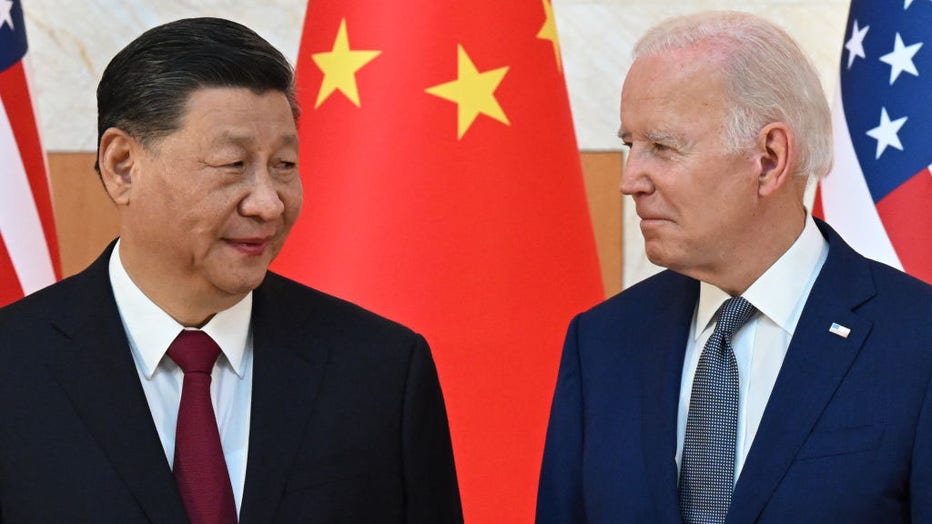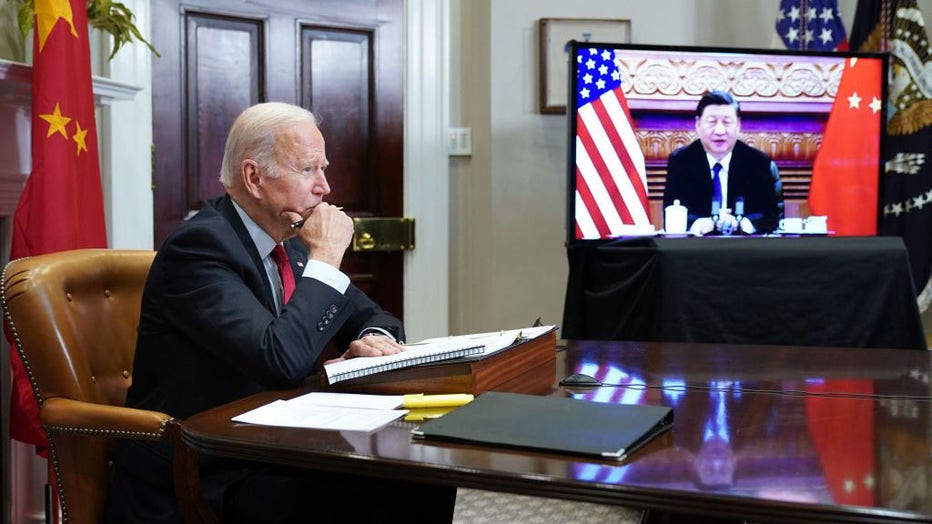Biden discusses Taiwan with China's Xi Jinping in effort to avoid 'conflict'
NUSA DUA, Indonesia - President Joe Biden objected to China’s "coercive and increasingly aggressive actions" toward Taiwan and raised human rights concerns about Beijing’s conduct in Xinjiang, Tibet, and Hong Kong during his first in-person meeting on Monday with President Xi Jinping, the White House said.
In a news conference following the meeting, Biden reiterated U.S. support for its longstanding "One China" policy. He also said that despite China's recent saber-rattling, he does not believe "there’s any imminent attempt on the part of China to invade Taiwan."
"It never has to come to that," Biden added.

US President Joe Biden (R) and China's President Xi Jinping (L) meet on the sidelines of the G20 Summit in Nusa Dua on the Indonesian resort island of Bali on Nov. 14, 2022. (Photo by SAUL LOEB/AFP via Getty Images)
The meeting, in the midst of Biden's seven-day, round-the-world trip, came as the superpowers aimed to "manage" differences between them as they compete for global influence amid increasing economic and security tensions. Speaking to reporters, Biden said that the U.S. would "compete vigorously, but I’m not looking for conflict," adding that, "I absolutely believe there need not be a new Cold War" with China.
Biden and Xi also agreed that "a nuclear war should never be fought" and can’t be won, "and underscored their opposition to the use or threat of use of nuclear weapons in Ukraine," the White House said. That was a reference to Russian officials’ thinly-veiled threats to use atomic weapons as its nearly nine-month invasion of Ukraine has faltered.
Biden and Xi also agreed to "empower key senior officials" on areas of potential cooperation, including tacking climate change, and maintaining global financial, health and food stability. It was not immediately clear whether that meant China would agree to restart climate change talks that Beijing had paused in protest of House Speaker Nancy Pelosi's visit to Taiwan in August.
Xi and Biden greeted each other with a handshake at a luxury resort hotel in Indonesia, where they are attending the Group of 20 summit of large economies.
"As the leaders of our two nations, we share responsibility, in my view, to show that China and the United States can manage our differences, prevent competition from becoming anything ever near conflict, and to find ways to work together on urgent global issues that require our mutual cooperation," Biden said to open the meeting.
RELATED: Biden says new spending cements US commitment to fighting global warming
Xi called on Biden to "chart the right course" and "elevate the relationship" between China and the U.S. He said he was ready for a "candid and in-depth exchange of views" with Biden.
Both men entered the highly anticipated meeting with bolstered political standing at home. Democrats triumphantly held onto control of the U.S. Senate, with a chance to boost their ranks by one in a runoff election in Georgia next month, while Xi was awarded a third five-year term in October by the Communist Party's national congress, a break with tradition.
"We have very little misunderstanding," Biden told reporters in Cambodia on Sunday, where he participated in a gathering of southeast Asian nations before leaving for Indonesia. "We just got to figure out where the red lines are and ... what are the most important things to each of us going into the next two years."
Biden added: "His circumstance has changed, to state the obvious, at home." The president said of his own situation: "I know I’m coming in stronger."

FILE - President Joe Biden meets with China's President Xi Jinping during a virtual summit from the Roosevelt Room of the White House in Washington, D.C., on Nov. 15, 2021. (Photo by MANDEL NGAN/AFP via Getty Images)
White House aides have repeatedly sought to minimize any notion of conflict between the two nations and have emphasized that they believe the countries can work in tandem on shared challenges such as climate change and health security.
But relations have grown more strained under successive American administrations, as economic, trade, human rights and security differences have come to the fore.
As president, Biden has repeatedly taken China to task for human rights abuses against the Uyghur people and other ethnic minorities, crackdowns on democracy activists in Hong Kong, coercive trade practices, military provocations against self-ruled Taiwan and differences over Russia’s prosecution of its war against Ukraine. Chinese officials have largely refrained from public criticism of Russia’s war, although Beijing has avoided direct support, such as supplying arms.
The White House said Biden specifically mentioned U.S. concerns about China's actions in Xinjiang, Tibet, and Hong Kong, and the plight of Americans it considers "wrongfully detained" or subject to exit bans in China.
Taiwan has emerged as one of the most contentious issues between Washington and Beijing. Multiple times in his presidency, Biden has said the U.S. would defend the island — which China has eyed for eventual unification — in case of a Beijing-led invasion. But administration officials have stressed each time that the U.S.'s "One China" policy has not changed. That policy recognizes the government in Beijing while allowing for informal relations and defense ties with Taipei, and its posture of "strategic ambiguity" over whether it would respond militarily if the island were attacked.
Pelosi's trip prompted China, officially the People's Republic of China, to retaliate with military drills and the firing of ballistic missiles into nearby waters.
The White House said Biden "raised U.S. objections to the PRC’s coercive and increasingly aggressive actions toward Taiwan, which undermine peace and stability across the Taiwan Strait and in the broader region, and jeopardize global prosperity."
In the meeting, Biden said China's economic practices "harm American workers and families, and workers and families around the world," the White House said.
It came just weeks after the Biden administration blocked exports of advanced computer chips to China — a national security move that bolsters U.S. competition against Beijing. Chinese officials quickly condemned the restrictions.
And though the two men have held five phone or video calls during Biden's presidency, White House officials say those encounters are no substitute for Biden being able to meet Xi in person. That task is all the more important after Xi strengthened his grip on power through the party congress, as lower-level Chinese officials have been unable or unwilling to speak for their leader.
Before the meeting, Chinese Foreign Ministry spokesperson Mao Ning had said China was committed to peaceful coexistence but would firmly defend its sovereignty, security and development interests.
"It is important that the U.S. work together with China to properly manage differences, advance mutually beneficial cooperation, avoid misunderstanding and miscalculation, and bring China-U.S. relations back to the right track of sound and steady development," she said at a daily briefing in Beijing.
White House officials and their Chinese counterparts spent weeks negotiating details of the meeting, which was held at Xi’s hotel with translators providing simultaneous interpretation through headsets.
The leaders spoke while seated facing each other at two long tables separated by more than a dozen feet and an elaborate floral arrangement inside a cavernous and windowless conference room.
U.S. officials were eager to see how Xi approached the Biden sit-down after consolidating his position as the unquestioned leader of the state, saying they would wait to assess whether that made him more or less likely to seek out areas of cooperation with the U.S.
Each leader was flanked by nine N-95 mask-wearing aides, and in the case of Xi, at least one official newly elevated in the recent Congress to its top leadership. U.S. officials said the interaction with top Xi aides could lead to more substantive engagements down the line.
Before meeting with Xi, Biden held talks with Indonesian President Joko Widodo, the G-20 host, to announce a range of new development initiatives for the archipelago nation, including investments in climate, security, and education.
RELATED: Biden hopes Putin will negotiate WNBA star Brittney Griner’s release
—-
Associated Press writers Josh Boak in Baltimore and Darlene Superville in Washington contributed to this report.



